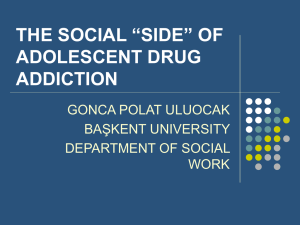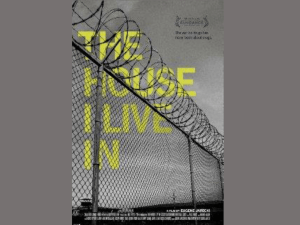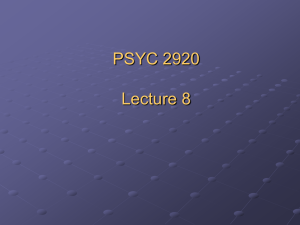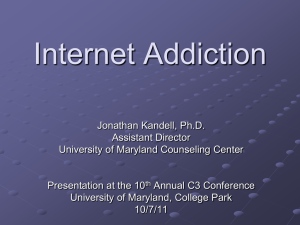SOC 4108 2.16.14 Theories of Use
advertisement
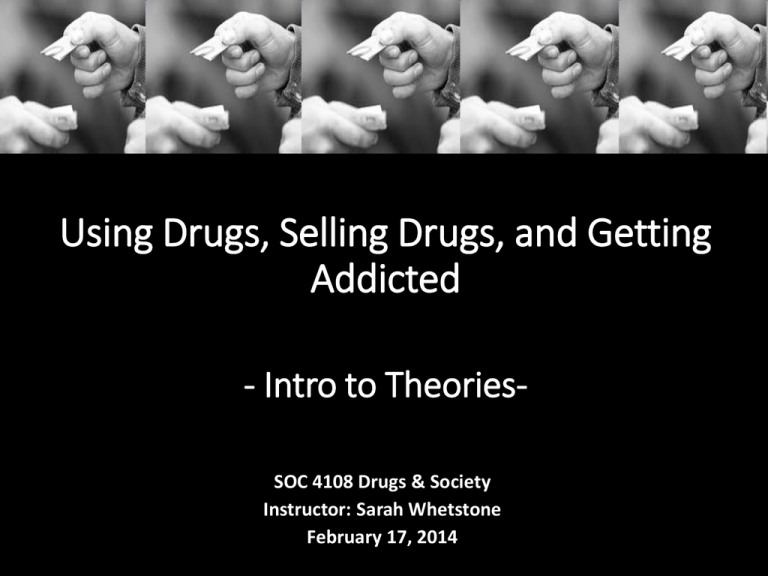
Using Drugs, Selling Drugs, and Getting Addicted - Intro to TheoriesSOC 4108 Drugs & Society Instructor: Sarah Whetstone February 17, 2014 Agenda • 6:20 – 6:50: Theories Lecture • 6:50 – 7:15: Small group discussion/worksheet on Bourgois’ ethnography – will be collected • 7:15 – 7:30: Break • 7:30 – 8:50: Planet Rock film – Reflection due next week Typology of Theories of Drug Use & Addiction THEORY INITIAL DRUG USE or INVOLVEMENT Nature Weil Biological DRUG ADDICTION Biogenetic Neurological/ “brain plasticity” Psychological Psychoanalytic Personality Psychoanalytic Personality Behavioral Sociological Differential Association Differential Reinforcement Becker’s Learning Theory Social Control Theory Strain Theory Conflict Theory Dislocation Theory Differential Reinforcement Becker’s Learning Theory Integrated Theory Strain Theory Cultural Deviance Theory Labeling Theory Conflict Theory Dislocation Theory Adapted from Faupel, Sociology of American Drug Use Nature Theories • Desire to alter consciousness with drugs is an innate human drive (Andrew Weil). • The ritual use of intoxicants is a cultural universal. • Drugs have been used throughout human history for celebration, ritual, coping, and pain relief. • Universality calls for value-neutrality. Biological Theories • Early theories emphasized weakness of individual • “Allergen Theory” • Biological predisposition: Focuses on the role of genetic susceptibility and family history in developing addiction. • Brain Plasticity: After initial drug use, chemicals fundamentally alter the functioning of neuron pathways in the brain, leading to heightened cravings, compulsive use, dependency, and physical withdrawal effects. Psychological Theories • Psychoanalytic – Drugs are used to alleviate frustrations over the inability to adjust to normal routines of adult life • Personality – Drugs are used by individuals with “addictive personalities.” • Behavioral – Operant conditioning - Behavior is reinforced when rewarded. Addiction results when drug becomes positive reinforcement (inducing pleasure) or a negative reinforcement (alleviating unpleasant withdrawal) Social Learning Theories • Alfred Lindesmith: Basis of sociology of addiction. Addiction results only when there is a cognitive connection that drugs alleviate withdrawal • Drug users become drug users through socialization-- learning through interaction with others. 3 Variants: • Becker’s Learning Theory: Individuals learn to become drug users through watching others administer the drug properly, and by learning to associate the effects with pleasure. • Differential Association – Edwin Sutherland – We learn behavior from people who have influence in our lives. • Differential Reinforcement – Ron Akers – Our behavior is reinforced through the rewards we get from our primary social group of interaction. Law-abiding groups are likely to discourage illicit drug use. SOCIAL CONTROL THEORY • People naturally want to “act deviant” or pursue their desires– Social control theory explains why they don’t. • Hirschi – Behavior defined as problematic can be avoided through the attachments or bonds that people have to conventional society • Attachment, Commitment, Involvement, Belief SOCIAL STRAIN THEORY • Attempts to explain higher drug use rates among different segments of the population • Robert Merton’s “anomie theory” • Approved social goals/ends (getting a college degree) do not always match available means (lack of educational funding) • Result = Feeling of normlessness and disillusionment, or “strain,” that can lead one to reject conventional standards CULTURAL DEVIANCE THEORY • Criminalization of drug use results in the creation of distinct “drug subcultures” • Charles Winick’s Integrated Structural Theory (combines cultural deviance theory and strain theory): • Access to drugs increases, more embedded in subculture of use • Disengagement from normative attitudes on drugs– create new beliefs and values • “Role strain” and “role deprivation” Labeling Theory • Focus on social reaction to drug use • Drug “problems” are constructed – Example: construction of binge drinking • Why are some behaviors defined as deviant? • Why are only some of the people who engage in a certain behavior defined as deviant? • What are the personal and social consequences of being labeled a “deviant?” CONFLICT THEORIES • Social inequalities-- racism, poverty, gender violence, & other forms of discrimination-- all shape involvement with drugs. • Why is drug use higher among people living in concentrated poverty? • Distribution of social problems creates observed differences in drug use. • Lack of economic opportunity • Living conditions • More psychic desire to escape pain-- Hopelessness • Addiction is a response to hardship. Drug policy must address the economic and political sources of inequality to be truly effective. ALEXANDER’S DISLOCATION THEORY OF ADDICTION • Why are so many people addicted to destructive habits in the globalizing world? • Why does addiction extend beyond drugs/alcohol to include so many other behaviors? • Why hasn't science been able to solve addiction? Growth of Free Market Capitalism Changes How We Experience Social Ties FAMILY LEISURE WORK 1. Globalization of Capitalist Free Market System 4. Proliferation of Addiction3 2. Decline of PsychoSocial Integration 3. Poverty of the Spirit Working in the Drug Trade • Philippe Bourgois- Anthropologist and ethnographer • Studies men working in the innercity crack trade in NYC’s Spanish Harlem for four years • Working in the drug trade was an important source of “dignity” and “respect” unavailable in mainstream labor market




